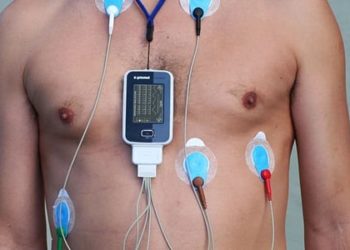Rivaroxaban and warfarin have similar safety and efficacy in mild atrial fibrillation-related ischemic stroke
1. In this randomized controlled trial, rivaroxaban and warfarin were similar in safety and efficacy when used to prevent early recurrence of stroke in patients with atrial fibrillation (AF)-related acute ischemic stroke.
2. Rivaroxaban was associated with reduced hospital length of stay.
Evidence Rating Level: 2 (Good)
Study Rundown: Patients that have atrial fibrillation (AF)-related ischemic strokes are at high risk of recurrent ischemic stroke and intracranial hemorrhage. However the optimal oral anticoagulation medication in this regard is not clear. This randomized, multicenter, open-label, blinded endpoint evaluation trial aimed to test whether rivaroxaban or warfarin is safer and more effective for preventing early recurrent stroke in patients with AF-related acute ischemic stroke.
Groups randomized to rivaroxaban or warfarin showed no differences in the primary composite endpoint of new ischemic lesion or new intracranial hemorrhage seen on MRI at 4 weeks. Each group only had 1 clinical ischemic stroke. All intracranial hemorrhages were asymptomatic and were deemed to be hemorrhagic transformations. Length of stay in hospital, however, was shorter for those randomized to rivaroxaban, likely owing to time required for warfarin uptitration. Strengths of this study included a randomized design. Limitations of this study included its low event rate and open-label design. Also, only 47% of those randomized to warfarin were within therapeutic anticoagulation range at 4 weeks, this study cannot be applied to individuals who achieve higher time in therapeutic window on warfarin.
Click to read the study, published in JAMA Neurology
Relevant Reading: Early Recurrence and Cerebral Bleeding in Patients With Acute Ischemic Stroke and Atrial Fibrillation Effect of Anticoagulation and Its Timing: The RAF Study
In-Depth [randomized trial]: This randomized, multicenter, open-label, blinded endpoint evaluation trial was conducted from April 2014 to December 2015 at 14 academic medical centres in South Korea. Patients included had mild AF-related stroke in the previous 5 days and were deemed suitable for early anticoagulation. Suitability was determined by diffusion-weighted image analysis of the acute ischemic lesion. Exclusion criteria included: significant hemorrhagic transformation, mechanical heart valve, stroke caused by small vessel occlusion, severe renal impairment and high risk of intracranial or systemic bleeding. Patients were randomized 1:1 to rivaroxaban (10 mg/day for 5 days then 15-20 mg per day for 4 weeks) or warfarin (with target INR between 2.0-3.0). Patients and responsible physicians were not blinded to the assignment, however adjudicators and assessors of the MRIs were blinded. The primary outcome was a composite of new ischemic lesion or new intracranial hemorrhage on results of follow-up MRI at 4 weeks. Secondary outcomes included individual components of the primary outcome as well as hospital length of stay. Outcomes were assessed in a modified intention-to-treat analysis. Statistical analysis included χ2 testing and Poisson regression.
Of 183 patients included in the primary analysis, 95 were in the rivaroxaban group and 88 in the warfarin group. At 4 weeks only 47% of patients in the warfarin group had achieved INR target between 2.0-3.0. For the primary composite outcome there were no significant difference between the rivaroxaban and warfarin groups (47 [49.5%] vs. 48 [54.5%]; relative risk 0.91; 95% CI 0.69-1.20, p = 0.49). There was also no significant difference for the individual components of new ischemic lesion or intracranial hemorrhage between groups. There was only 1 clinical ischemic stroke for each group. Hospital length of stay was reduced in the rivaroxaban group (median 4.0 days vs. 6.0 days; p < 0.001).
Image: CC/Wiki
©2017 2 Minute Medicine, Inc. All rights reserved. No works may be reproduced without expressed written consent from 2 Minute Medicine, Inc. Inquire about licensing here. No article should be construed as medical advice and is not intended as such by the authors or by 2 Minute Medicine, Inc.







